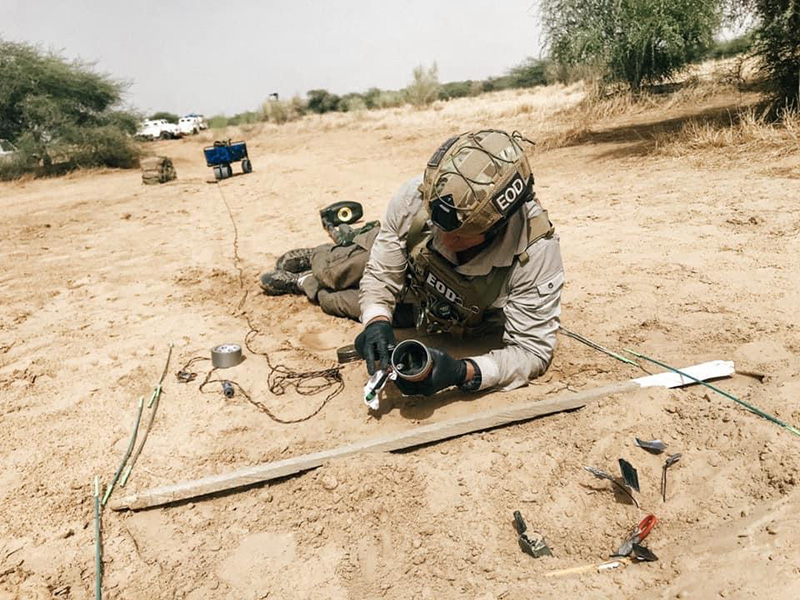Mine Action in Mali
From Ammunition Technician to Mine Action Project Manager in Mali: documenting the inimitable career of Chris ‘Yogi’ Lawrie. #MineActionApril
SafeLane’s most recently mobilising project is in Mali, and on the ground it’s PM Chris ‘Yogi’ Lawrie who’s responsible for all aspects of this critical mine action project’s success.
We got the chance to catch up with him despite his busy schedule, and of course, the first question we had to ask was about his nickname!
“The day I joined the army when I was just 17, we were all lined up alphabetically. I was standing next to a little lad with the surname Lloyd. I was 6'2" and 16 stone and he was 5'3" and about 8 stone!
Our Training Sergeant took one look at us and said to me: “you’re Yogi and he’s Boo Boo!”
It stuck with me not only for the 23 years I was in the Army but right up until today – only people who don’t know me call me Chris!”
With that cleared up, it was time to talk about Yogi’s life in explosive ordnance and improvised explosive device disposal, and his current role managing a critical mine action project in Mali.
“My grandfather was a tugman on the Thames, and he moved down to Milford Haven, which is where my family still heralds from.
After I left school in Milford, I spent 23 years in the British Army, leaving on the day before my 40th birthday. I was an Ammunition Technician, did four tours of Northern Ireland, and also went to Afghanistan, Bosnia and Iraq as operational explosive ordnance disposal (EOD).
I joined ISSEE after the army and delivered explosives training – but within 6 months I was up and out and contracting abroad. I’ve worked in many nations including Afghanistan, Mali, Saudi Arabia, Libya and Iraq which is where I first met Danny Carter.
Danny Carter is now my International Operations Manager at SafeLane, but I taught the men who taught him in the army. So, I’m like his professional grandfather and can keep him in line!"
How is this training and mentoring mine action project in Mali going to make a difference?
"In terms of this current role, there are two sides to it. We’re training and mentoring a range of peacekeeping bodies in Mali. We’re training them to add capacity to their own national security. We add security and train people to search for and safely deal with improvised explosive devices.
The work is critical to protecting the Malian people and comes under the banner of mine action.
The other side of the project is training international military forces to deliver effective SSP - which is safety and security of peacekeepers.
We will be training Egyptian, Sri Lankan, Cambodian and Nepalese military in their home countries, before supporting them when they come to Mali and go into operations."
How do you mentor operational EOD teams?
"When they are then in-country we attach to their EOD teams and go with them on missions. We advise all the way though, whatever they find.
As we’re all ex-military too, our advice is military focused, for example, not staying in one area for too long so they are not targeted. We will work with them to the point at which they require less and less mentoring. We then get them accredited by our client, a global peacekeeping entity.
We want these teams to be confident to operate more freely, because it’s at that point they feel they have achieved a lot more. It’s a truly beneficial process for everyone involved. We take great pride in watching these teams grow professionally – and they take great pride in supporting the greater mine action picture."
What is the focus of this training and mentoring project in Mali?
"All of this work is fundamentally about getting rid of IEDs, which is the biggest killer we have got. They are completely indiscriminate and will just as likely kill a civilian as a soldier. The work we will do, the teams we will train and mentor, everything is aligned to making Mali safer.
From my side, I have spent 37 years dealing with explosive ordnance and IEDs and have always been EOD and IED focused. Despite rising through the ranks, I will sometimes actively choose a more junior role and get back to working on my belt buckle and pulling devices out of the ground. It’s just how you stay relevant.
I bring this up-to-date knowledge to this project, and can use it to be the most supportive PM possible for my fantastic team.”
Thank you, Yogi for your time, and for explaining the essential work of this critical mine action project. We’re proud of you and your team.
Find out how we can help you


